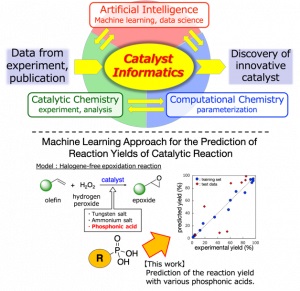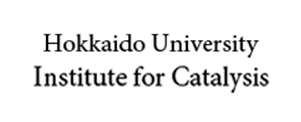TEAMDigital-Driven Chemistry Team

Our team is promoting research on "digitally driven chemistry" with the aim of fusing chemistry with data science such as artificial intelligence (AI), computational chemistry, automation, and robotics. Our research interests are product design of fine chemicals (materials informatics (MI)), catalyst design technology (catalyst informatics (CI)), manufacturing process design of fine chemicals and design of synthetic route (process informatics (PI)), etc. We promote fundamental and application research to develop new materials, new reactions and new catalysts, process plant design and automation/control system, with the use of data science, computational science, and digital technology such as simulators. We aim to digitize academic and chemical industries.
Team Leader, Dr. Akira Yada (Ph. D.)
研究テーマ
- Development of digital-driven technology for designing new functional materials and catalysts
- Development of functional soft materials and PI technology by signal processing
- Laboratory automation technology toward new reactions and catalysts
Development of digital-driven technology for designing new functional materials and catalysts
Aiming at the discovery and development of innovative catalysts autonomously, we are working on “catalyst informatics” research that integrates catalytic chemistry, computational chemistry, and data science. We are also developing new technology for designing synthetic and degradation pathways for functional chemicals, which contribute to a carbon-neutral or circular economy that should be accomplished urgently.

References
Chem. Lett. 2018, 43, 283-287 (link, Press release)
Synlett, 2021, 32, 1843-1848 (link)
Development of functional soft materials and PI technology by signal processing
We are developing soft actuators and soft robots by synthesizing functional soft materials and utilizing their functions, and developing capillary gel electrophoresis equipment using gel mesh as a separation medium. We are also conducting research and development on process informatics technology (anomaly detection and predictive maintenance) using machine learning over signal processing.
Laboratory automation technology toward new reactions and catalysts
We aim to automate various unit operations of synthetic chemistry, for overcoming bottlenecks in research and development, to accelerate the discovery of new reactions and the development of highly efficient catalysts. We are promoting research focusing on flow reactions, which have high needs for automation because various unit operations are linked together.
メンバー
-
Team Leader
Akira Yada
a-yada
-
Senior Researcher
Yusuke Hara
y-hara
-
Senior Researcher
Koichiro Masuda
koichiro-masuda
-
Senior Researcher
Kanako Kumada
k.kumada
-
Technical Staff
Kaori Nagaoka
-
Technical Staff
Yukiko Okamoto
-
Temporary Technical staff
Ei-ichi Nakai
-
Temporary Technical staff
Maki Inose
-
Temporary Technical staff
Tadafumi Uchimaru
-
Temporary Technical staff
Naoko Suzuki
-
Visiting Researcher
Masahito Hayashi
* add “@aist.go.jp”
研究成果
- ・Research Articles
- Masuda, K.; Agalave, S. G.; Chen, W.; Onozawa, S.; Shimada, S.; Sato, K.; Kobayashi, S. Continuous-Flow Diels-Alder Reactions of Unactivated Dienes over Zeolitic Catalysts. Asian J. Org. Chem. 2022, Early View, e202200382. https://doi.org/10.1002/ajoc.202200382. selected as Front Cover.
- Makino, Y.; Matsuo, H.; Masuda, K.; Onozawa, S.; Nakazato, T. Rapid and Sensitive Determination of Leached Platinum Group Elements in Organic Reaction Solution of Metal-Catalyzed Reactions by Laser Ablation-ICP-MS with Spot-Drying on Paper. J. Anal. At. Spectrom. 2022. Advance Article. https://doi.org/10.1039/D2JA00141A.
- Kitanosono, T.; Lu, F.; Masuda, K.; Yamashita, Y.; Kobayashi, S. Efficient Recycling of Catalyst-Solvent Couples from Lewis Acid-Catalyzed Asymmetric Reactions in Water. Angew. Chemie Int. Ed. 2022, 61 (25), e202202335. https://doi.org/10.1002/anie.202202335.
- ・Press releases
To be updated
- ・Reviews, books
To be updated


